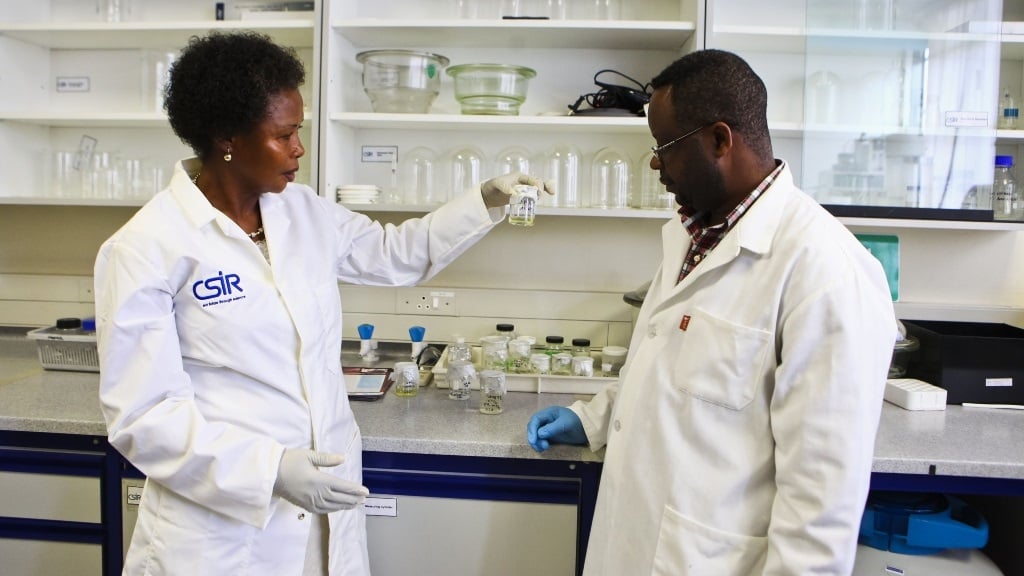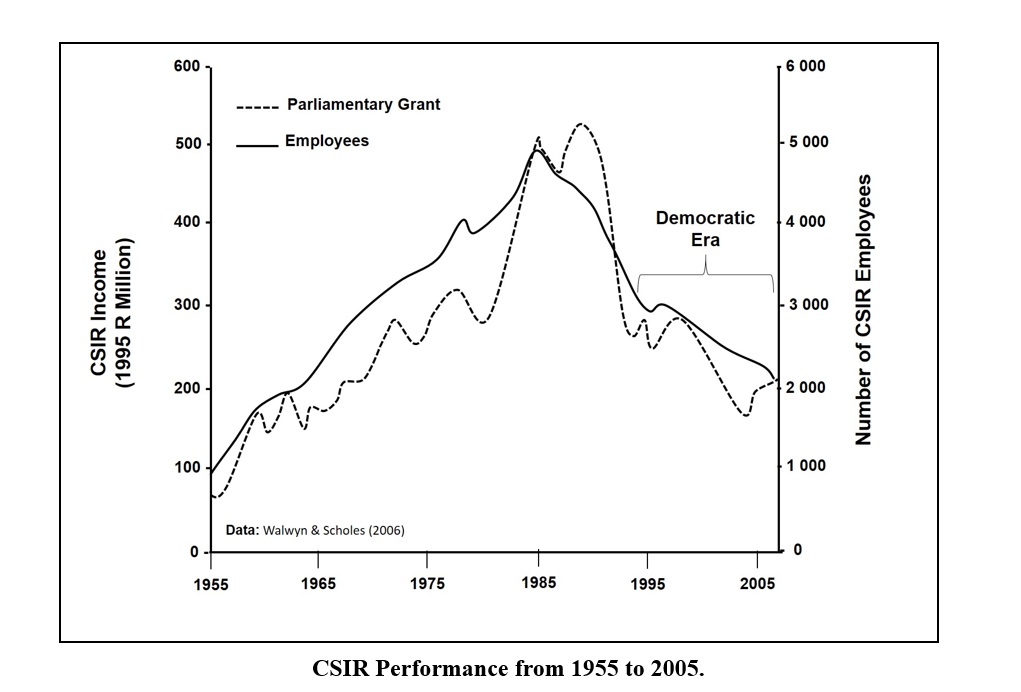
In half a decade South Africa has gone from being a world leader in the treatment of sewage to becoming the victim of a tsunami of untreated sewage, overwhelming our rivers, and threatening the very foundation of our national economy, writes Anthony Turton.
I recently wrote about ingenuity as a key element in making rich countries rich, and keeping poor countries poor, using a model developed by a Canadian named Thomas Homer-Dixon. Today I delve deeper because it is core to our future prosperity as a nation. Every Commonwealth nation has a Council for Scientific and Industrial Research (CSIR), sometimes with a slightly altered name as in Australia, which adds an "o" for "organisation" to the acronym.
The reason for the creation of these organisations is simple.
The Second World War posed an existential threat to Britain, and therefore her survival was dependent on technology. Key among those technologies was radar, which became a game changer during the Battle of Britain.
One of the key personalities involved in the highly classified work to develop radar was Basil Schonland, who was born in Grahamstown in 1896. His father was Selmar Schonland, a botanist and founder of Rhodes University, where Basil Schonland later studied before going to Cambridge University. He served as a volunteer in the Signal Service of the Royal Engineers in World War 1.
His military career evolved as he eventually became the commanding officer of the South African Special Signals Service. He was seconded to the British military during World War II, where he became deeply involved in the radar programme.
It was radar technology that enabled RAF fighters to be scrambled to intercept Luftwaffe bombers during the Battle of Britain.
READ | CSIR collaborates with SAPS to strengthen cybercrime investigations
At the end of the war, South Africa was a colony, so it followed the British-led initiative by passing legislation in 1945 that created the CSIR, with Schonland as the founding president.
Within a decade, the CSIR became a world leader in the application of microwave technology – a spinoff from radar – to measure distance between two stationary points. This was called the tellurometer, which revolutionised land surveying globally.
Within two decades of its creation, the CSIR developed the Heavy Vehicle Simulator (HVS), which enabled the performance of road surfaces to be tested with great accuracy. This gave South Africa pothole-free roads as a foundation for sustained economic growth in the 1960s to 1990s.
National asset
During the 70s, the CSIR pioneered the first water recovery from sewage, applied in the city of Windhoek, enabling the safe reuse of water for drinking purposes in a water-constrained economy. Decades later, this concept was implemented in Singapore. In the 80s, the CSIR became involved in lithium-ion battery research. In 1997, the CSIR had such a sophisticated computer service that it was sold off to MIH Ltd to become MWEB.
It can safely be concluded that the CSIR is a national asset, with a proven track record of generating the technical ingenuity that gave South Africa a comparative advantage in the global market. I would go further by saying that it was the success of the CSIR that enabled South Africa to diversify its economy away from mining and agriculture, to manufacturing and the early stages of the knowledge economy.
It therefore becomes interesting to unpack what has happened to the CSIR between 1955 and 2005. This was published in the South African Journal of Science in 2006. The results have been redrawn from that original text and are shown here for illustrative purposes.
CSIR Performance from 1955 to 2005.
The dotted line shows income to the CSIR from parliamentary grant money. In effect, this represents the cash invested by the taxpayers into the creation of new technologies needed to sustain our economic growth and development as a diversifying economy in the future. This peaked in 1985, which was a significant year, for that was when Pope John Paul II called for comprehensive economic sanctions against South Africa. The USA enacted the Comprehensive Anti-Apartheid Act in 1986. From 1984, while this was playing out, capital flight began – R9.2 billion in 1985, R6.2 billion in 1986, R3.1 billion in 1987, R5.5 billion in 1988 – triggering the collapse of the rand, ushering in the need for exchange control.
On the external side of the national security calculus, this coincided with the big military operations in Angola, most notably the Battle of the Lomba that destroyed two Fapla brigades, effectively neutralising them as a fighting force in 1987. Internally, this coincided with the rapid loss of control by the police, as the Township Wars slowly made the country ungovernable.
So, what does all this mean today, as populist calls for decolonisation drive public discourse?
It tells us that our capacity to innovate has been dealt a fatal blow, at a time when our population has doubled, but our capacity to create employment has halved. The solid line shown on the graph represents highly skilled human capacity, which peaked in 1985, and steadily declined from 5 000 to less than half of that in 2005. Initially, these skills were lost due to the financial crisis associated with economic sanctions, but after 1994, the trend continued, as the decolonisation sentiment drove policies.
READ | Anthony Turton: What took 50 years to occur in Hartbeespoort Dam, took only 3 years in the Vaal
It was during this time that skills transfers were supposed to occur, consistent with the political transformation imperative that the ANC government had mandated for all state departments, and subsequently as BEE legislation. This transfer simply never happened, because the outgoing skilled personnel often left the country, while the remaining few were fearful that they would lose their jobs if they surrendered their skills.
Stated differently, basic survival instinct kicked in as technically competent people clung to their skills, believing that by so doing, they could retain their jobs just a little longer. The flip side of the same coin saw incoming graduates from historically disadvantaged communities being set up to fail. This combination of drivers, thus coincided to destroy what skills were left, creating what Thomas Homer-Dixon would define as an "ingenuity gap".
The decolonisation rhetoric merely provided some ideological justification for what became a self-inflicted wound. It is for this reason that we now face an existential crisis in the water sector. Whereas we were world leaders in the 70s, when it came to technology development for the safe recovery of water from waste, today we see our technical institutions being overwhelmed by the rapid rate of change occurring in rivers contaminated by sewage. In half a decade we have gone from being a world leader in the treatment of sewage to becoming the victim of a tsunami of untreated sewage, overwhelming our rivers, and threatening the very foundation of our national economy.
We need to review the policies that are destroying our capacity to innovate, and we need to halt the haemorrhage of skills from institutions like the CSIR, and our universities. In truth, the CSIR has a proven track record of excellence, more than paying its own way by converting parliamentary grant money into cutting-edge technologies, that gave South Africa a comparative advantage in the global economy.
READ | Anthony Turton: Pecanwood Estate experiment leads to discovery of new species of microfauna
We need to incentivise our scientists, engineers, and technologists to apply their minds once again to the next generation of sewage management, and the development of technologies needed to create national water security as a precursor to restoring investor confidence in our country. If we don't do this, then the Born Free generation will never be fully employed in their lifetime, and the flames of revolution will once again engulf us.
Think of it like this – double the population must be employed in a shrinking economy using technologies developed by half the skilled human resources we had 50 years ago – which is clearly an ingenuity gap. This is why poor countries get poorer, which is a tragedy too catastrophic to allow.
- Dr Anthony Turton – Centre for Environmental Management University of Free State




 Publications
Publications
 Partners
Partners

























